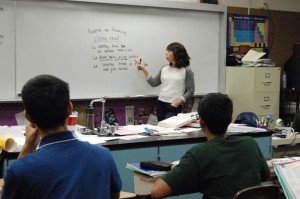
As the saying goes, “Failing to prepare is preparing to fail.” With that maxim in mind, several Diamond Bar High School teachers have already begun to introduce their students to the Common Core standards, which will be officially implemented next school year.
The new standards, meant to prepare upcoming students for tasks in the real world, require more reading comprehension and conceptual thinking skills in all subjects, not only in English.
Science teacher Carly Russo is one of the first DBHS teachers who has already altered her lesson plans for the onset of the new education system. Because of the new standards, Russo explained that her lessons now included not only lecture and hands-on lab activities, but also reading assignments that require students to absorb textbook material and glean information pertinent to the topic.
“It does force the students to become active learners. They can no longer sit and listen to the lecture, and write notes. They have to delve into the material themselves and remember [the information],” Russo said.
The Chemistry teacher continued to share how the sharp change affected her students and their approach to learning. She recounted how her students were initially shocked when she instructed them to read an article, analyze it, and write a follow up essay, an assignment usually not expected in a science class.
“I think that our students, as we use these strategies, will be more prepared, or better prepared, for college when they’re not given so much direction on how to get the information,” she said.
The science department isn’t the only subject challenged by the new national education system. The standards have also changed the mathematics curriculum; now, schools are instructed to include certain concepts such as Algebra 1, Geometry and Algebra 2 material over the course of three years. Because several schools, including DBHS, are far ahead of the delineated material, the Common Core system allows schools to determine how much of the curriculum they would like to follow.
The most difficult aspect of adopting the novel system would be the new standardized testing format, as most sections of the test will consist of free response questions. To prepare his students for the upcoming challenge, math teacher Les Schaefer designated a portion of his class time on a regular basis to review Common Core standardized test questions. The math teacher explained further that he, along with other Trigonometry teachers, started reviewing to improve students’ STAR testing scores.
“I figured that I would take the plan we used last year and apply it this year to the Common Core material,” Schaefer said.
Also beginning to prepare her students for the free-response-focused standardized testing, English teacher Sonita Crane shared how a large portion of her assignments for her ninth grade class focuses on writing short paragraph answers rather than the usual story questions out of the textbook.
“The ninth graders are at a disadvantage because they only have two years to prepare, whereas kids in elementary have longer time to prepare for the Common Core,” Crane said.
She also explained that for her Advanced Placement and Honors classes, the Common Core standards are already expected of her students, which gives students an easier transition. “It’s like what they call unchartered waters; we’re trying to figure out what exactly to do as we go,” she shared.




